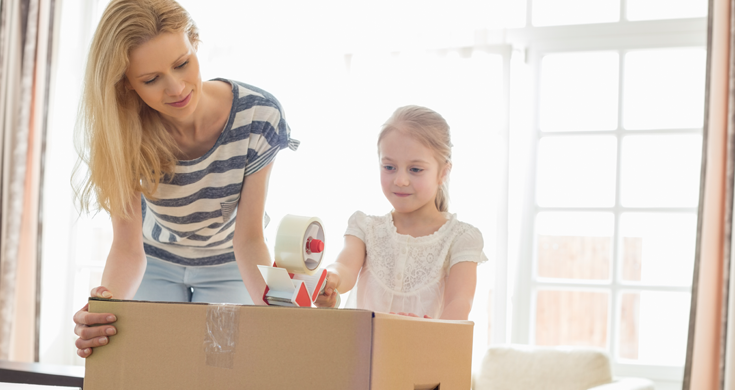Moving to a new home is a huge milestone for anyone at any age, but it can be particularly unnerving for children. Children regard their physical home as a stable foundation in their lives—and the loss of that foundation can be distressing, and even traumatic, unless it’s handled with understanding and compassion.
There’s a good chance that, at first, your kids might resist the very concept of moving, but instead of getting upset, it’s important for you to try to see it their way so that you can help them cope with their concerns.
How a Move Can Affect Your Kids
News of a move might make your children feel that they have no control over things. It also might give them a feeling that nothing in their world is stable anymore. And the disruption to their school routine can also be difficult—no one wants to be the “new kid” at a new school. To help them deal with these emotions, the best thing you can do is talk to them about why the move is necessary, and why it’s a positive situation rather than a negative event.
According to the experts, moving is somewhat easier on children younger than six years old because their perceptions and understanding are more limited, but you’ll still need to talk to them so they’ll know what’s going on. For example, when you pack their toys, you’ll need to emphasize that you’re not throwing them away; you’re taking them all with you.
Older children will be especially upset if the move separates them from friends. You’ll want to stress the fact that they can still keep in touch with their old friends as well as make new ones.
Making the Transition Easier
According to social worker Lori Collins Burgan, author of Moving with Kids, children often feel powerless during a move because they didn’t have any input in the decision. That’s why, Burgan says, it’s important to ask for your children’s input and involve them in making decisions whenever you can. These tips can help your children feel more involved in the process:
- Make initial decisions together: Before house hunting, have a family meeting so that everyone can talk about what they want in the new house and neighborhood. Be sure to listen to your kids and take their suggestions seriously.
- House hunt together: Since children get restless, the best way to do this is to make a shortlist of the best homes you’ve viewed, then take your kids along to help with the final decision.
- Let your children help decorate: If they’re old enough, allow your children to choose the colors, paints, carpet, and wallpapers for their rooms. This way, they’ll feel that the room is truly theirs, and they’ll enjoy it more if it’s done to their taste.
Make the Move Exciting
These tips will help you make the move more interesting and exciting for your child:
- Make packing more fun: Packing can be a depressing chore, but you can make it more entertaining for you and your kids by providing plenty of snacks and high-energy music while you work together. Plus, make sure there’s a reward afterward, such as a fun movie night with everyone’s favorite films.
- Throw a “see you later” party: Before you move, throw a fun-filled party for your family and your child’s best friends. To keep things positive, call it a “see you later” party—goodbye sounds too sad and final.
One more packing hint: This isn’t the time to persuade your children to get rid of favorite old toys, even if your kids are teenagers. It’s better to give away that Education Tips for My Children in Kindergarten book than take those beloved, played-with action figures away from your now-teenage kids during packing, because those old toys can help make the new home feel more familiar.
If your child is anxious about trying a new school, you may want to consider enrolling him or her in a virtual school. Students can attend public school at home via online learning. They’ll still have state-certified teachers and connect with classmates, but they won’t have the stress of being the only new student in a crowded classroom. Instead, they’ll be part of a vibrant online community with the option to join extracurricular clubs and programs to meet new people. Learn more about online schools and request more information about schools in your area.
In the end, plenty of encouragement and an upbeat attitude can go a long way toward cheering up your kids. If you keep reminding them of all the good things about the new house, they’ll hopefully start seeing the move as a positive thing, and even look forward to it with pleasure.
For more on how to support your kids before and after a family move, see this infographic below:



























































